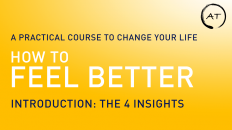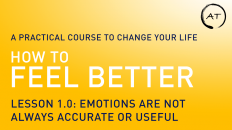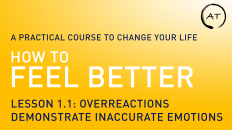We’ve seen that emotions can be inaccurate for a couple different reasons. Reactions to the past, emotions based on incorrect assumptions, and conflicting emotions all cause problems in our lives.
Now that you know that not all emotions are accurate, you can take the next step to feeling better.
It’s time to learn how to tell if an emotion is accurate and good for you.
Remember that emotions are reactions based on the past. And where is the past stored? It’s in your memory.
Our mind is web of feelings, events, and sensations. Any emotion you have is directly connected with the situation and feeling responsible for the emotion. Therefore, to find the memory of the situation, focus on the feeling.
Here’s how to find the memory behind an emotion:
- Focus on the emotion. Really feel it. Amplify the emotion and let it consume your whole consciousness.
- Think about when you had this feeling before. What events or memories come to mind?
- Whatever the first thing to pop into your head is, go there.
- Is the feeling there?
- If not, restart and find another memory.
- If so, try to feel for an even earlier memory.
- When you have the earliest memory associated with the feeling, write it down.
Congratulations! You’ve found an emotional memory.
If at first this exercise feels like grasping for straws, that’s okay. Finding the memory behind an emotion takes practice. You’ll get the hang of it. Eventually, you’ll be able to find the memory behind an emotion in a few seconds.
Now, it’s all well and good to know the memory behind an emotion, but you’ll need to do a little bit more work to tell if the emotion is accurate and useful for you.
With the memory and feeling known, ask yourself two questions:
- What is the cause of the emotion?
- What is the purpose of the emotion?
If the cause (the events behind the emotion) is not reasonable, the emotion is not a fully accurate representation of your reality. If the purpose is not aligned with your goals in life, the emotion is not useful.
Let’s say that I want to be a public speaker. That’s my goal. If I’m scared of talking to groups, my fear is not aligned with my goal. Furthermore, if the fear comes from a memory of me accidentally walking onto a stage as a child, then the cause is not something that will repeat. My bad experience as a child does not recur in my adult life. My fear is inaccurate.
Try to apply the cause + purpose framework to your emotions as your first step to feeling better.
The second step is where the magic happens. Emotions can change. You will learn how to change your emotions in the next section.


